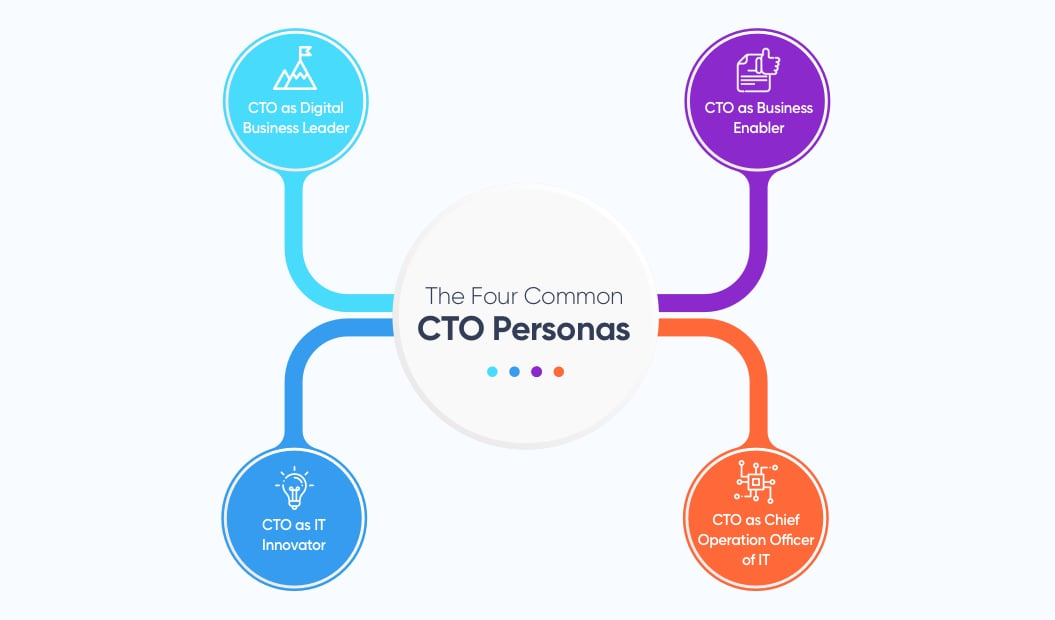Finding the perfect Chief Technology Officer (CTO) for your startup can be a game-changer, ensuring your venture achieves its full potential. But what does it really take to find the right CTO? In this blog post, we’ll provide a comprehensive guide on “how to find a CTO for your startup”, exploring the importance of their role, identifying the ideal candidate, networking strategies, online platforms, alternative solutions, and evaluation methods. Get ready to embark on a journey that could transform your startup’s trajectory!
Key Takeaways
- CTOs are essential for startups to drive innovation, stay competitive and align technology with business goals.
- Identifying the ideal CTO requires assessing technical expertise, leadership abilities, adaptability and problem-solving skills.
- Evaluating potential candidates involves assessing their technical skills & experience as well as cultural fit & enthusiasm for the project.
The Importance of a CTO in Startups

A CTO plays a pivotal role in startups, driving technological innovation and aligning it with business objectives to guarantee success. Possessing extensive technical proficiency, robust analytical and problem-solving capabilities, practical know-how, and essential leadership skills, a CTO can make or break your venture. Their primary responsibilities include:
- Developing and introducing an MVP
- Assembling a tech team
- Overseeing all internal procedures
- Ensuring quality and troubleshooting
- Executing DevOps tasks
- Constructing and regularly updating the architecture
With such a critical role, it’s no wonder finding the right CTO is a top priority for many founders.
Driving technological innovation
A technical co-founder, sometimes synonymous with the Chief Technology Officer, is responsible for:
- Propelling technological innovation
- Staying abreast of industry trends
- Executing cutting-edge solutions
- Determining the technical vision, innovation, and direction of the business
Without a CTO, startups developing products may stumble upon unanticipated technical risks that could hinder future success. Thus, to stay competitive in the constantly changing tech landscape, it’s advantageous to have a CTO on board.
Aligning technology with business goals
A CTO’s role goes beyond just driving innovation; they must ensure that technology is aligned with business goals, guaranteeing that the tech strategy is in line with the startup’s overall vision and objectives. This requires strong technical talent and the ability to effectively communicate with both technical and non-technical individuals in the team.
An experienced IT leader is necessary for in-house IT specialists in tech co startups to establish and oversee their collaborative efforts. Ultimately, a skilled CTO will act as a bridge between technology and business, ensuring that the two work in harmony to drive success.
Identifying the Ideal CTO for Your Startup

An ideal CTO should possess comprehensive technical knowledge and experience in their domain, along with a history of successful projects. They should demonstrate strong leadership and managerial capabilities to effectively lead the development team and make sound decisions. Additionally, they should be able to adapt and resolve issues promptly. Building a list of benefits, utilizing recruiting sources, and making a competitive offer are recommended steps to take when looking to hire a CTO for a startup. However, identifying an appropriate leader can be a challenging endeavor due to various factors.
If a full-time CTO isn’t a viable option, part-time or freelance CTOs, technical advisors, or outsourcing development work are feasible alternatives. Regardless of your startup’s requirements, it’s crucial to thoroughly assess each candidate’s skills, experience, and compatibility before reaching a decision.
Technical expertise and experience

The search for a CTO should prioritize candidates with the following qualifications:
- Experience with your desired tech stack
- Broad technical expertise
- Hands-on experience in their field
- A track record of successful projects
- A strong background in computer science or a related field
- Familiarity with the technologies and platforms employed by the startup
- Industry knowledge and connections to provide valuable direction and assistance in navigating the market and attracting investors.
In summary, the technical expertise and experience of a CTO are essential for driving innovation, ensuring product quality, and achieving business goals.
Leadership and management abilities
Leadership and management capabilities are indispensable for a CTO to successfully direct the development team and take strategic decisions. Excellent communication and organizational proficiency, problem-solving aptitude, and the capacity to direct and supervise a team are all necessary for a CTO. A CTO can demonstrate leadership and management abilities by establishing clear goals and expectations for the development team, assigning tasks, and offering feedback and direction.
Strong leadership not only ensures that the technical team operates efficiently but also fosters a culture of innovation and collaboration within the organization.
Adaptability and problem-solving
Adaptability and the capacity to quickly resolve issues are essential for a CTO, as startups often come across unanticipated difficulties and must rapidly adjust. A CTO can demonstrate adaptability in a startup environment by:
- Honing adaptability skills
- Appreciating the value of working across multiple projects and contexts
- Regularly assessing progress and modifying the technological vision
- Promptly reacting to alterations and taking advantage of new possibilities
- Cultivating a culture of open dialogue and cooperation
By being adaptable and skilled in problem-solving, a startup CTO can help the startup overcome challenges and seize opportunities for growth.
Networking and Building Connections

Networking can be a powerful tool in your quest to find a CTO for your startup, whether through personal connections or at industry-related events.
Utilizing social media to make a post and request referrals may also be useful. Leveraging your personal network and attending meetups can be advantageous. While networking, it’s essential to be open to new connections and prepared to discuss your startup’s vision and objectives.
Personal network
Utilize your personal network by:
- Requesting referrals and recommendations from acquaintances, friends, and colleagues
- Informing others of the search through social media
- Utilizing Facebook Lists
- Participating in industry conversations on Twitter
- Appearing professional in searches
- Applying one’s personal touch
Additionally, engaging with the community and cultivating a positive online presence are essential. By tapping into your personal network, you increase the likelihood of finding a CTO who aligns with your startup’s vision and values.
Industry events
Attending tech meetups can be a beneficial approach to networking and potentially locating a CTO for your startup. Be prepared to encounter technical jargon and buzzwords. It is important to select tech meetups judiciously and concentrate on those that are most pertinent to your startup’s requirements.
Participating in industry events such as conferences, meetups, and hackathons is an effective way to identify potential CTO candidates and expand your network. By being proactive and engaged at industry events, you increase your chances of connecting with the perfect CTO for your startup.
Online Platforms and Resources

Digital tools like job boards, co-founder matching platforms, and social media can significantly aid your search for a CTO. As a digital business leader, the author perceives online platforms as a means to expand one’s network, yet cautions that it can be easy to become overwhelmed with the sheer volume of material and prospects.
Establishing milestones to effectively analyze and utilize the connections and data gathered is recommended.
Job boards and LinkedIn
Job boards and LinkedIn are digital resources that can be employed to post job openings and search for potential CTO candidates with the requisite skills and experience. To optimize a LinkedIn job posting to attract the right CTO candidates, one can personalize outreach, highlight the company’s unique selling points (USPs) during the recruitment process, and utilize a CTO recruitment agency to manage the entire recruitment process, from job postings to candidate interviews.
By taking advantage of job boards and LinkedIn, you can reach a wider pool of potential CTO candidates and increase the likelihood of finding the perfect fit.
Co-founder matching platforms
Investigate co-founder matching platforms such as CoFoundersLab and AngelList to establish a connection with tech professionals who are interested in joining a startup. The success rate of finding a CTO through co-founder matching platforms can vary, though some platforms report a match rate of more than 90%.
By exploring co-founder matching platforms, you can connect with potential CTOs who share your passion for the project and are eager to contribute to your startup’s success as co founders.
Social media and tech forums
Engage with social media and tech forums to find potential CTO candidates and learn more about their expertise and interests. LinkedIn, GitHub, Stack Overflow, AngelList, and certain tech-specific job boards are among the top social media platforms for locating tech professionals. Potential CTOs may frequent forums such as CTO Vision, The CTO Advisor, High Scalability, CIO Journal, and IT Professional.
By participating in online discussions and connecting with potential candidates, you can gain valuable insights into their technical abilities and assess their compatibility with your startup.
Alternatives to Hiring a Full-time CTO

If a full-time CTO isn’t within your startup’s resources, consider alternatives like part-time or freelance CTOs, technical advisors, or outsourcing your development work. Each alternative comes with its own set of advantages and challenges, but all can provide valuable technical expertise and guidance for your startup.
Part-time or freelance CTOs
Part-time or freelance CTOs are tech consultants who provide valuable guidance and expertise without the obligation of a permanent role. The cost of hiring a part-time consultant is more economical than employing an in-house specialist, the cooperation model is adaptable, and the investments required are comparatively low for the highest level of expertise. Examples of successful startups that have utilized part-time or freelance CTOs through platforms like Toptal include Thumbtack, Bridgestone, and Motorola.
While there may be some potential disadvantages, such as reduced investment in the company or unreliable quality of work, hiring a part-time or freelance CTO can be a viable alternative for startups with limited resources.
Technical advisors and mentors
Technical advisors and mentors are experienced professionals who offer strategic advice and support to guide technology decisions for startups. When selecting a technical advisor, it’s important to consider factors such as:
- Their past experience and projects
- Their work ethic
- Their analytical thinking abilities
- Their commitment to achieving results
By engaging technical advisors and mentors, startups can benefit from their expertise and guidance without the need for a full-time CTO.
Outsourcing development work
Choosing an outsourcing partner for product development as a startup is a critical decision that can significantly impact the success and scalability of your business. The primary factor to consider is the partner’s track record in building successful products. A partner with a proven history brings not just technical expertise but also valuable insights into market trends, user preferences, and potential pitfalls. They are likely to have refined processes and methodologies that have been tested and optimized over various projects, ensuring a more efficient and effective development cycle.
Another advantage of an experienced outsourcing partner is cost-effectiveness compared to building an in-house team, particularly for a startup. Hiring a full-time Chief Technology Officer (CTO) and technical team involves substantial overhead costs, including salaries, benefits, and resources for training and development. In contrast, outsourcing allows you to tap into a pool of specialized talent on a project basis, significantly reducing your financial burden. This approach not only saves money but also allows for greater flexibility and scalability, as you can scale your team up or down based on project requirements without the long-term commitments associated with full-time hires. Moreover, an outsourcing partner who understands how to build successful products can bring a fresh, unbiased perspective to your project, often leading to innovative solutions that an in-house team, potentially constrained by internal biases and processes, might overlook.
Engaging a tech agency or development team for outsourced development work can provide access to a specialized pool of professionals without the need to hire a full-time CTO. When determining to outsource development work, startups should evaluate aspects such as:
- Cost savings
- Communication
- Project goals and objectives
- Resources and technology
- Capability to meet deadlines
- Quality assurance
- Security and confidentiality
- Scalability
- Cultural fit
- Recommendations and references
By outsourcing development work, startups can access skilled professionals and maintain a focus on their core business objectives.
Evaluating Potential CTO Candidates

A thorough evaluation of potential CTO candidates should include an assessment of their technical skills, leadership abilities, and their compatibility with your startup’s culture. By taking a thorough approach to evaluating candidates, you can increase the likelihood of finding the right CTO who aligns with your startup’s vision, values, and objectives.
Assess technical skills and experience
Evaluating a potential CTO’s technical skills and experience can be done by reviewing their portfolio, past projects, and industry knowledge. Pay close attention to the types of projects they have worked on, the technologies they have used, and the outcomes they have achieved. A candidate’s problem-solving skills, creativity, and ability to deliver results can also be assessed through their portfolio and past work, which showcases their hard and soft skills.
By thoroughly examining a candidate’s technical background, you can gain valuable insights into their potential as a CTO for your startup.
Evaluate leadership and management abilities
Assessing a potential CTO’s leadership and management abilities can be done by discussing their approach to team management, decision-making, and problem-solving. Pay attention to their communication style, leadership techniques, and ability to motivate and encourage their team. It’s important to ensure that the candidate has the capacity to establish clear goals, provide guidance and support, and cultivate a dependable culture within the organization.
By evaluating a candidate’s leadership, management, and soft skills, you can determine their potential for effectively guiding your startup’s technical team.
Cultural fit and passion for the project
Ensuring a potential CTO is a good cultural fit and passionate about the project is vital for a successful collaboration. It’s important to discuss the candidate’s work style, alignment with your company values, and their interest in your startup’s mission and vision.
By taking the time to evaluate a candidate’s cultural fit and passion for the project, you can increase the likelihood of finding a CTO who will be dedicated to your startup’s success and growth.
Summary
In conclusion, finding the right CTO for your startup is a critical decision that can significantly impact your venture’s success. By understanding the importance of a CTO’s role, leveraging personal networks and industry events, utilizing online platforms and resources, exploring alternative solutions, and thoroughly evaluating potential candidates, you can increase the likelihood of finding the perfect CTO who aligns with your startup’s vision and values. With the right CTO on board, you can drive technological innovation, align technology with your business goals, and propel your startup towards success.
Frequently Asked Questions
How do I get a CTO for my startup?
Reaching out to successful tech companies, leveraging social media and looking on freelance platforms are all great ways to find a CTO for your startup. Start building your network and you should be able to find a suitable candidate in no time.
How do I find a technical co founder for a startup?
Connect with other entrepreneurs in your network, search online communities like Reddit and LinkedIn, and attend startup events and conferences to find a suitable co-founder for your startup. You may also benefit from the free Co-Founder Matching Program offered by YCombinator, as well as CoFoundersLab which is a great resource for finding mentors and advisors.
When should a startup hire a CTO?
When it comes to hiring a CTO, most startups decide to make their first hire during the seed stage in order to allow enough time to develop and share their vision.
What is the average equity for a startup CTO?
CTO’s typically receive equity between 0.5-50%, depending on the risk involved with the startup. This amount of equity usually reflects the risks taken by the CTO.
How much does a CTO earn in a US startup?
On average, a CTO in US startups earns $192,871 annually or approximately $92.73 per hour. This is 11.2% lower than the average salary of $107,083 in Software startups.